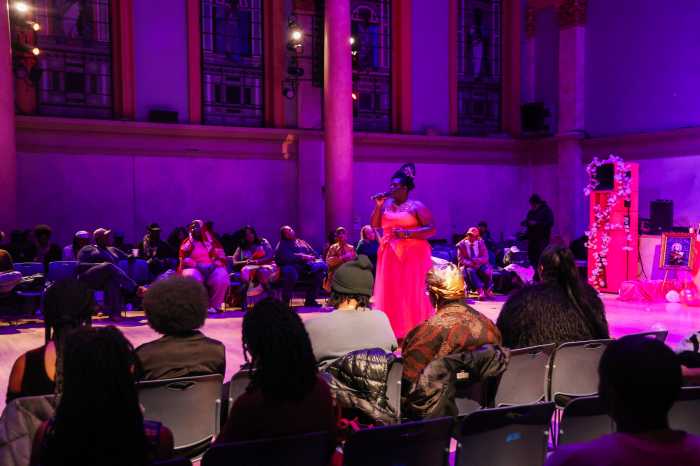Mare Winningham, now appearing in Nina Raine‘s “Tribes” at Barrow Street Theatre (27 Barrow St. at Seventh Ave. So., through Sep. 2; barrowstreettheatre.com), was something of an acting legend in her Los Angeles youth. In the magnificent documentary, “Shakespeare High,” it is revealed that, back in the day, everyone knew of this phenomenal Chatsworth High School girl, who won all the acting competitions, often alongside her classmate Kevin Spacey.
“There was something in the water of that decade,” she told me. “So many actors came out of there. The excitement of those competitions was intense, and the comedown afterwards was so severe for me that I was so grateful there would be another one, weeks away. It was addictive, incredibly competitive, but also very friendly and social. Our teachers would encourage us to direct as well, and I remember my mom asking me if I’d even started practicing my own monologue yet. I would spend the weekend working on it, which basically meant co-opting the bathroom from my five siblings and going there in front of the big old mirror.”
“Tribes,” with its compassionate take on deafness, is Winningham’s third foray into this theme, after her TV work in “Helen Keller: the Miracle Continues” and “Love is Never Silent”: “This is something that’s come back into my life and I think there’s a reason. When I met [partially deaf co-actor] Russell Harvard, he signed to me. I had quite a vocabulary back in 1985, but it faded away. I do know how to sign ‘I’ve forgotten everything,’ which I did to him, but then he spoke, ‘You’ll remember. My mother remembers you from the movie,’ and she’d told him, ’Oh, you can sign to her. She’s fluent.’ My bad, but if you don’t practice… Our cast needs to take some time out and maybe hire a coach to help us. We try and learn a couple of phrases every night, but it always degenerates into cuss words or tasteless phrases. I’m like the old lady, saying, ‘Come on kids, let’s get serious!’”
Asked if she ever gets sick of being asked about her classic Brat Pack movie, “St. Elmo’s Fire,” Winningham laughs, “No, but I’m always surprised that it was such a cultural moment in time. I missed it somehow because I was older then than everyone that was in it and pregnant with my third kid. I really poopoo’ed it: ‘Whatever this little dude thing is, I’ll just do it.’ And then it came out and kind of defined a generation. I didn’t see it coming and am still surprised when somebody tells me, ‘That was the most important movie of my college years!’ and I’m, ‘All right, I was fat with a baby and laughing it off as best I could.’ Joel Schumacher seemed to know the zeitgeist, and we were sort of like ‘Friends’ before ‘Friends.’
Winningham’s co-actors — Demi Moore, Rob Lowe, Andrew McCarthy, etc. — went on to have big starry careers, where she seemed always to be a character actor, even in lead roles: “Yeah. I’m here to tell to tell other actresses who look like me that it’s not a bad thing [laughs]. There are sometimes too many glamorous, beautiful, youthful people, and they all compete. I really had my pick of the great TV movies for a 15-year run, and they were really good parts, primarily Everywoman or girl next door or person you would recognize yourself in. They were not star roles, but character-driven. Looking like an average Joe is not bad.”
Winningham does star in “Hatfields & McCoys,” filmed in Romania: “I have the best role, I think, as the matriarch of the McCoys, who thinks her husband is dead in the Civil War, with ten kids to raise. So when he shows up in the first scene, she feels like she’s seeing a ghost, and the trajectory of her character is so great because she has a little bit of psychic ability to know that no good is gonna come of any of it. She is methodically broken down, as one by one her sons are killed, and ends up in an insane asylum. It breaks your heart because all she wants is a double boiler, a very simple woman who can’t get anything she deserves or needs.
“In my career, I can look back and think, ‘Okay, recognize when it’s good because you see how a lot of time goes by before you get a great part. You gotta do what you gotta do, but every ten years there’s something special and this feels like one of those.”
Winningham’s Oscar-nominated “Georgia” was definitely one of those: “Great movie, and those people are still my dearest friends — Jennifer Jason Leigh, her mother Barbara Turner [the screenwriter], and our director, Ulu Grosbard, who just passed away. By coincidence, Barbara had come out here to see my play and we found out Ulu had died the day before. We went to his memorial, which was amazing, but it brought up all that special time, when we went to Cannes. I kind of owe them the high point of my career.
“Oscar night was tricky, because Kevin Spacey and I — who had done ‘The Sound of Music’ in high school together — to be sitting at the Dorothy Chandler Pavilion … He was right in front of me with his mom and I was the row behind with my parents, and at one point he turned around and we were both like, ‘Look where we are!’ He had Red Vines, so we were all eating licorice, and I knew I wasn’t going to win so I was just relaxed, in a stunning Vera Wang gown, soaking it all in. Mira Sorvino had won every single award for ‘Mighty Aphrodite,’ so everyone in our category knew we could all just hang.
“And then Kevin won! I wish I could have shared that night with Jennifer, because she should have been nominated. But I was walking to my seat and Meryl Streep was walking toward me — My God, it’s Meryl! — and she stopped me and said, ‘Omigod, “Georgia” was so amazing. Will you do me a favor and tell Jennifer that that was one of the greatest performances?’ So I got to call Jenny and tell her that.”
“Atta Girl: Tales from a Life in the Trenches of Show Business” (iuniverse.com) is actress Peggy Pope’s memoir, the title of which comes from her most famous line from her most famous role as Margaret Foster, the office lush in “Nine to Five.” Meeting Pope, you can easily see why she’s been steadily employed for more than half a century — she’s a total original, with her adorable voice and accent, forthright manner, and offbeat wit, all of it masked in a genuine wide-eyed innocence that is frankly irresistible.
“I couldn’t get a reading for ‘Nine to Five,’ she confessed. “And then my agent called: ‘You wanna do it tonight? They’re going into production tomorrow.’ So I went in and the only other one there was a woman with white hair. I thought, ‘They want some old biddy.’ I had come from New York leads in regional shows and was half-hearted about this small part. [Director] Colin Higgins said, ‘Hello, but I was actually thinking of her as someone older.’ I didn’t care anymore and said, ‘You want old? There’s old in the lobby! Why don’t you get her?’ And he drew back and said, ‘I never heard an actress talk like that. Actually, because I wrote it, with a flick of the pen I could change that.’ I said, ‘Yeah, you could.’ Then I left, and they called me and said, ‘Show up.’”
Pope played Agnes Gooch to Ann Miller’s Mame, “but I didn’t know how to sing, and Gooch has a two and a half-octave song with a high B flat. Ann Miller was just a delicious singer, everything perfect with the dancing, but she didn’t act really well. She’d never done a live play before, and her idea of acting was not to move when the other person was talking because the camera wasn’t on her.
“Every night when I hit that high note — I would just get there some way or another — she was such a good sport about it. She had these long false eyelashes and the only giveaway was that they would flutter while she waited for me, but very disciplined and never said a word about it. She had five wigs because she sweated so much, but she didn’t know about curtains or flies.
“Once she grabbed me and said, ‘Peggy, what are the flies?’ So I told her a little bit about them, not that things could fall on you from there. She kinda lost interest, didn’t need to know about that. And she also didn’t know about the 20-pound bar in the curtain hem which made it fall right. Every night, she didn’t realize the audience who was standing up all had white hair — it was Florida — and all they wanted was to get into their limos ahead of each other. She thought it was a standing ovation, and she would go out and take another bow and the poor stage hand would be jumping on the curtain rope. Finally, they took him away to the hospital because he pulled a muscle.”
Helen Hayes, the most overrated actress to ever bear the title First Lady of the American Theater “was very domineering during ‘Harvey.’ One night Marian Hailey, who played Helen’s daughter, came to me in the dressing room and said, ‘Miss Hayes hit me!’ There’s a scene with Mrs. Chauvenet that opens the play and the older woman, who played her, could never do it to Helen’s satisfaction. Hayes told her how to make her entrance, and one night she and Marian were waiting in the wings to make their entrance. Hayes kept complaining about her, ‘Why can’t she get that right?’ and Marian, who always spoke the truth, said, ‘I think you’re making her nervous, telling her how to do it.’ Hayes stopped and said, ‘You’re very bossy!,’ and she hit her hard on the arm with her cane! Marian was as white as a sheet.”
Gorgeous, tragic Romy Schneider (1938-82) is being celebrated at French Institute Alliance Français with a retrospective of her films through June 26 (22 E. 60th St.; fiaf.org). She became a star at 17 when she played the Empress Elizabeth of Austria in the fondly recalled “Sissi” series of movies, and went on to work with some of the most prominent directors of her time — Orson Welles, Luchino Visconti (for whom she again played Elisabeth in his “Ludwig”), Claude Sautet, Bertrand Tavernier, Joseph Losey, Robert Siodmak, Costa-Gravas, Henri Clouzot, and more.
Her personal life was turbulent, with her husband Harry Meyen committing suicide and her 14-year-old son by him, David, dying when he impaled himself on a fence in 1981. She was found dead from alcohol and pills in her Paris apartment in 1982.
At the height of her stardom, she had an intense affair with actor Alain Delon, and the film she made with him, “Christine,” a remake of Schnitzler’s “Liebelei,” which had starred her mother, Magda, in 1933, is part of the series. Lusciously photographed in color, they were perhaps the most impossibly beautiful couple in film history, enough to make Brangelina look like a pair of ouch-faces. Delon, who remained a friend, arranged for her to be buried with her son, and each year since 1984, the Prix Romy Schneider is awarded to the most promising young actress in French cinema.
Contact David Noh at Inthenoh@aol.com and check out his blog at nohway.wordpress.com.



































